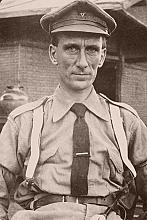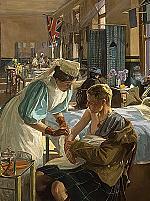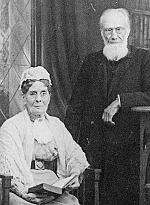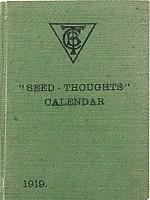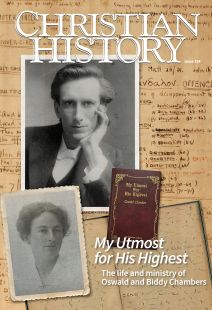Serving God here and “Beyond”
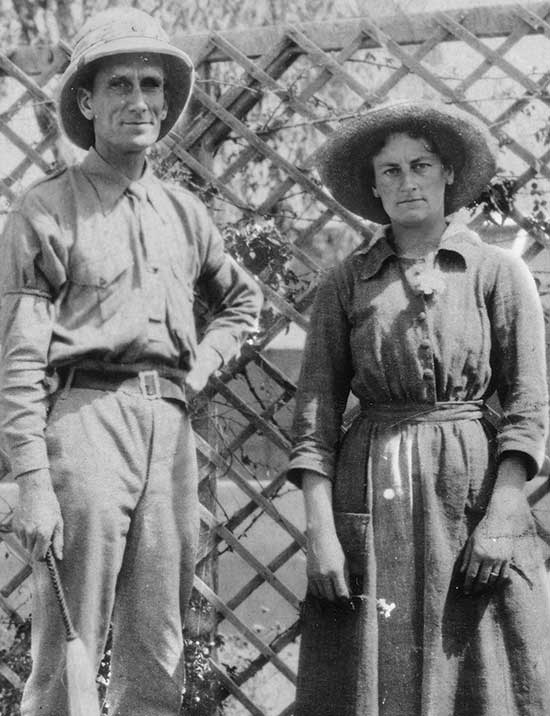
[Above: Oswald Chambers and Biddy standing in front of lattice fence, 1917—Used with permission of the Oswald Chambers Publications Association, Ltd. / images courtesy of Wheaton Archives & Special Collections, Wheaton College, IL]
In October 1915 Oswald Chambers sailed across the Mediterranean, bound for Cairo after shutting down the Bible Training College (BTC) in London. In Egypt he would serve as part of the YMCA’s support for Allied soldiers. Aboard the ship Chambers reflected on his decision to leave. He wrote in his diary that the move was “something of the nature of an earthquake.” In a letter to a friend, he compared shuttering the BTC to Abraham’s near sacrifice of Isaac. He continued, with more hope, “I am sure we will be back and the BTC will go on again more blessedly than ever.”
THE “CRIME OF CRIMES”
In Cairo Chambers encountered a city transformed into a military staging grounds for the British war against the Ottomans. The British had envisioned a swift victory against the Ottomans in the Gallipoli campaign, an attack at the narrow Dardanelles Strait that would eventually give them access to Istanbul. As with so many Great War plans, the campaign ended in violent miscalculation. The Allied powers (Britain, France, and Russia) retreated by January 1916.
Chambers did not shy away from the larger theological implications of supporting the war effort, pondering the supernatural forces behind such choices. But he recognized that in wartime, men had to confront reality and the concerns of the soul. “Don’t misunderstand me,” he wrote to a friend. “I am not inhuman, the ghastly crimes of war are unspeakable, but they certainly are no worse than sin, that is the crime of crimes.” [emphasis in original]
For the two years that followed, Chambers continued to reflect on the “unreality” of prewar life and the freedom from it that came during the war. He saw men battered at Gallipoli as they returned to Cairo to convalesce. He met still others who asked for spiritual guidance, two of whom, after praying to receive the Holy Spirit, were unexpectedly called to the front the following morning.
Soon after Chambers arrived in Egypt, Biddy, Kathleen, and several former BTC students joined him to assist in the YMCA huts, providing entertainment, letter writing, and other services to the soldiers. Chambers’s camp in Zeitoun added a devotional hut that became a
center of Christian teaching. In this way the practices of the BTC continued—a rebuilding after the “earthquake,” now in a transformed landscape. Chambers referred to this new ministry as the “BTC Expeditionary Force.”
His lessons included topics such as Christian ethics, psychology, and the triumph of redemption over rationalism. While the Australian and New Zealand Army Corps (ANZAC) infamously frequented brothels in Cairo, Chambers’s YMCA huts were a source of edification.
After the retreat from Gallipoli, Oswald was often called away to teach in other parts of Egypt. Biddy kept the Zeitoun camp running, sometimes stepping in to teach.
But just as important to both Oswald and Biddy as teaching was their ministry of hospitality. This included opening up their home, the “Bungalow,” for small groups, one-on-one ministry, dinners, and lavish free Sunday teas. The Bungalow became a spiritual and emotional oasis to thousands of men, providing the comfort of home in the midst of a demanding desert war. Biddy gave herself fully and tirelessly to this work. Oswald never took her for granted, writing:
When I consider how completely and nobly you have foregone all quiet civilized influences that other women have, and have been living a literal hand to mouth existence all transfigured by your great love for me and Him, I must bow my head in dedication and say God bless thee!
CHAMBERS STILL SPEAKS
Throughout their time in Egypt, Chambers never forgot his earlier vision for renewing the BTC after the war. His diary regularly reflected on the teachings he planned for the college’s future. Though he died before seeing it, even his death would mark a continuation of his ministry. Mrs. William Jessop, wife of the YMCA general secretary, wrote of Chambers’s death, “With his great gifts he is serving God in a much wider sphere in the Beyond: while here, though absent in body, he yet speaks through the notes taken by his devoted wife, and through the lives of those whom he taught.”
By Annalise DeVries
[Christian History originally published this article in Christian History Issue #154 in 2025]
Annalise DeVries, associate professor of history at Samford UniversityNext articles
Baffled to Fight Better
During the spring of 1917, Chambers spoke nightly on the book of Job
Oswald ChambersChristian History Timeline: Oswald Chambers
In His presence: the life and work of Oswald Chambers
the editors



